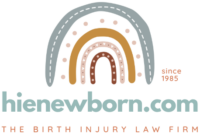Fill out the form below to share details about your situation
Early Intervention is Key
One of the most important things parents can do for their child with HIE is to seek out early intervention services.
This could include physical therapy, speech therapy, occupational therapy, and nutritional therapy. The early intervention aims to help your child develop the skills they need to grow and develop. Starting therapy as early as possible gives your child the best chance for success.
Create a Supportive Environment
Children with HIE may need extra support as they grow and develop. As a parent, it’s important to create a supportive environment that promotes your child’s health and wellness and encourages your child to explore and learn.
Assembling a team of medical professionals involved in your child’s care and development is important. In addition to a pediatrician, your child may need to be regularly seen by their pediatric neurologist, as well as occasionally evaluated by a pediatric orthopedist, pediatric gastroenterologist, and pediatric ophthalmologist.
Adapting your home to be more accessible for your child may be necessary. Additionally, you should seek out play activities suitable for their developmental level. When your child feels supported and encouraged, they are more likely to thrive.
Advocate for Your Child
As a parent of a child with HIE, you will likely need to become an advocate for your child. Working with healthcare providers, educators, and therapists could help ensure your child gets the necessary care and support.
This could be beneficial for your child’s health and well-being.
It’s important to be proactive and communicate clearly with the people involved in your child’s care. Be bold and ask questions. Speak up if you feel your child’s needs are not being met.
Take Care of Yourself.
Caring for a child with HIE can be challenging and stressful. Taking care of yourself is essential for being the best caregiver for your child. Take breaks when necessary. Incorporate self-care activities, such as exercise or meditation, into your routine.
Seek out support from people who understand your situation.
Celebrate Your Child’s Progress
Finally, it’s important to celebrate your child’s progress. Children with HIE may reach developmental milestones at a different pace than their peers, but every accomplishment is worth celebrating.
Take time to acknowledge your child’s progress, no matter how small it may seem. This can help build your child’s self-esteem and can be a source of encouragement for you as a parent.
Our birth injury attorneys are here to support you
If you have questions about filing a medical malpractice claim,
call the experienced birth trauma attorneys at The Yost Legal Group. We carefully investigate and file birth injury claims, cerebral palsy claims, HIE claims, and medical negligence cases on behalf of our clients.
Our birth injury attorneys are here to support you and guide you through the legal process. We make filing birth injury lawsuits as stress-free for our clients as possible.
Birth Injury FAQs
What can I do to Help my Child Thrive?


Seeking out early intervention and creating a supportive environment can give your child the best chance for success. Every child is unique, and there is no “one-size-fits-all” approach to caring for a child with HIE. Keep open lines of communication with your child’s care providers, teachers, and therapists. Share updates on progress, concerns, and goals. Being proactive helps everyone stay on the same page and focused on your child’s well-being.
How can I Best Advocate for my Child with HIE?


Advocating for your child with HIE (Hypoxic-Ischemic Encephalopathy) is a journey that requires dedication, compassion, and resilience. Here are some friendly, trustworthy tips to help you be the best advocate for your child:
- Educate Yourself
Learn as much as you can about HIE, available therapies, and your child’s specific needs. Understanding the medical and developmental aspects empowers you to make informed decisions and ask the right questions. - Build a Supportive Care Team
Work closely with doctors, therapists, and specialists. Don’t hesitate to seek second opinions or ask for additional resources. Your involvement ensures your child receives comprehensive, personalized care.
Why is it Important to Celebrate your child’s Progress?


When your child has been diagnosed with HIE (Hypoxic-Ischemic Encephalopathy), celebrating their progress—no matter how big or small—is incredibly important. Every milestone reached is a testament to your child’s strength and resilience, as well as your dedication as a parent. Progress after an HIE diagnosis can look different for every child, and sometimes the journey is filled with challenges and uncertainty. By recognizing and celebrating each achievement, you’re reinforcing your child’s sense of accomplishment and self-worth.
Celebrating progress also helps build hope and motivation for both you and your child. It creates joyful moments in the midst of ongoing therapy and medical appointments, reminding your family that every step forward is meaningful. This positivity can fuel perseverance, encourage continued effort, and foster a supportive environment where your child feels loved and valued.
With patience, perseverance, and a commitment to your child’s well-being, you’re helping them reach their full potential. Every celebration—no matter how small—honors their hard work, encourages further growth, and strengthens the bond you share.
How Can I prioritize Self Care While Caring for my HIE Child?


Caring for yourself helps you stay strong and present for your child. Take time for rest, relaxation, and activities that recharge you. Remember, your advocacy makes a real difference in your child’s life. With patience, perseverance, and a commitment to their well-being, you’re helping your child reach their fullest potential—every step of the way.


